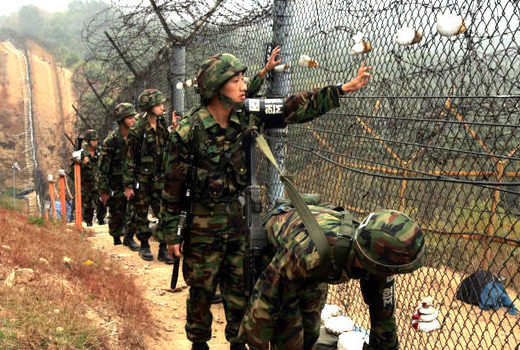 |
|
South Korean soldiers check the southern fence of the demilitarized zone between North and South Korea.
|
Inter-Korean matters take backseat to international politics
Since the 2000 South-North summit, South Korea has made utmost efforts to strengthen the inter-Korean relationship. However, this relationship now faces a "collective crisis" due to North Korea’s alleged nuclear test on October 9. In the wake of the alleged test, inter-Korean relations will likely be affected by the international political situation, losing their driving force. Seoul stands at a crossroads, caught between keeping step with the hard-line stance of the international community and maintaining the basis of the engagement policy with its neighbor to the north. South-North relations have experienced many ups and downs since the historic summit between former president Kim Dae-jung and North Korean leader Kim Jong-il. In previous cases, inter-Korean relations were stalled because of domestic problems within the two Koreas. This time, however, Seoul-Pyongyang relations and the international political situation are inexorably connected. This will make it difficult to foresee the future shape of relations between the North and South. At a press conference on October 9, President Roh Moo-hyun said, "The government may not be able to continue its engagement policy with the reclusive state." Regarding concrete countermeasures against the North, the president said cautiously, "We should come up with strategically coordinated measures," again indicating that the government would most likely change the basis of its engagement policy toward the North.The government issued a statement after the National Security Council (NSC) meeting on October 9 and said that it would "closely consult with the international community." In that case, the key fruits of the engagement policy, the Gaeseong (Kaesong) Industrial Complex and Mt. Geumgang (Kumkang) tour program, will also be seriously hit. Another official, asking not to be named, said, "If the U.N. sanctions against North Korea include a ban on regular commercial trade, Seoul won’t be able to avoid [being part of] such a situation, as well." Even if the U.N. does not adopt a severe resolution against the North, it is likely to deal a serious blow to the two biggest projects under inter-Korean economic cooperation. The first distribution of slots for businesses at the Gaeseong complex, which has been delayed since North Korea’s missile test launches on July 5, will be delayed indefinitely. In addition, the South Korean government subsidy for the Mt. Geumgang tour program will likely be suspended. If the situation worsens, the government will have to withdraw South Korean citizens working at Gaeseong and Mt. Geumgang. Seoul is largely expected to a take hard-line stance against Pyongyang on all inter-Korean exchanges. For example, South Korea has already suspended additional shipments of aid to flood victims in North Korea, and Seoul is likely to discourage civilians from visiting the communist nation. Depending on the situation, humanitarian aid for the North and civil exchanges may be stopped entirely. Some are urging Seoul to behave prudently. A government official said on condition of anonymity, "The government itself is wrongly closing dialogue channels with the North," warning that "inter-Korea relations may again go cold" for a number of years. Another official noted, "If the government abandons the Gaeseong Industrial Complex or the Mt. Geumgang tours, it would be impossible to restore them later." Paek Hak-sun, an analyst at Seoul’s independent Sejong Institute, said that "hard-line policies can’t solve the problem completely. The only way to minimize the negative effect is to seek dialogue and negotiation." Cho Seong Ryol of South Korea’s Research Institute for International Affairs, said, "The basis of the engagement policy toward North Korea is to separate military and non-military matters. We can’t stop inter-Korea dialogue unilaterally."






